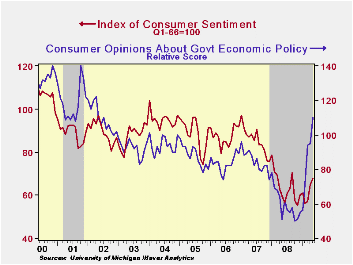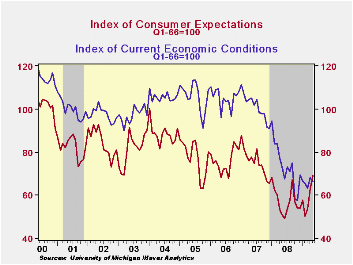 Global| May 15 2009
Global| May 15 2009Michigan Consumer Sentiment Up On Improved Expectations With Heightened Hopes For Gov't Policy
by:Tom Moeller
|in:Economy in Brief
Summary
Improved consumer spirits regarding the outlook raised the University of Michigan's early-May reading of consumer sentiment to the highest level since September of last year. The gain in the index to a level of 67.9 exceeded Consensus [...]

Improved consumer spirits regarding the outlook raised the University of Michigan's early-May reading of consumer sentiment to the highest level since September of last year. The gain in the index to a level of 67.9 exceeded Consensus expectations for a reading of 66.0.
The expectations component of consumer sentiment, which had been improving, jumped another 9.4% to its highest level since late-2007. The gain was fueled by improved expectations for business conditions during the next year which jumped also to the highest level since 2007. Expected conditions during the next year surged by a similar degree. Unlike last month, however, the higher stock market failed to lift the expected change in personal finances which deteriorated moderately.
The opinion of government policy, which may eventually influence economic expectations, jumped sharply to the highest level since 2002. Thirty-three percent of respondents thought that a good job was being done by government, up from the four- percent low of last December, while a much reduced 23 percent of respondents thought that a poor job was being done.
The current economic conditions index stuttered, but just slightly, as the reading for current personal finances fell. The drop was offset, however, by an improved read of current conditions for buying large household goods to the highest level since last August.
Inflation expectations for the next year fell to 2.9% versus a reading which was as high as 7.0% last May.
The University of Michigan survey data is not seasonally adjusted. The reading is based on telephone interviews with about 500 households at month-end; the mid-month results are based on about 300 interviews. The summary indexes are in Haver's USECON database with details in the proprietary UMSCA database.
Raising the credit bar, or getting clubbed by it? from the Federal Reserve Bank of Minneapolis can be found here.
| University of Michigan | Mid-May | April | March | May y/y | 2008 | 2007 | 2006 |
|---|---|---|---|---|---|---|---|
| Consumer Sentiment | 67.9 | 65.1 | 57.3 | 13.5% | 63.8 | 85.6 | 87.3 |
| Current Conditions | 66.2 | 68.3 | 63.3 | -9.7 | 73.7 | 101.2 | 105.1 |
| Expectations | 69.0 | 63.1 | 53.5 | 35.0 | 57.3 | 75.6 | 75.9 |
Tom Moeller
AuthorMore in Author Profile »Prior to joining Haver Analytics in 2000, Mr. Moeller worked as the Economist at Chancellor Capital Management from 1985 to 1999. There, he developed comprehensive economic forecasts and interpreted economic data for equity and fixed income portfolio managers. Also at Chancellor, Mr. Moeller worked as an equity analyst and was responsible for researching and rating companies in the economically sensitive automobile and housing industries for investment in Chancellor’s equity portfolio. Prior to joining Chancellor, Mr. Moeller was an Economist at Citibank from 1979 to 1984. He also analyzed pricing behavior in the metals industry for the Council on Wage and Price Stability in Washington, D.C. In 1999, Mr. Moeller received the award for most accurate forecast from the Forecasters' Club of New York. From 1990 to 1992 he was President of the New York Association for Business Economists. Mr. Moeller earned an M.B.A. in Finance from Fordham University, where he graduated in 1987. He holds a Bachelor of Arts in Economics from George Washington University.
More Economy in Brief
 Global| Feb 05 2026
Global| Feb 05 2026Charts of the Week: Balanced Policy, Resilient Data and AI Narratives
by:Andrew Cates






